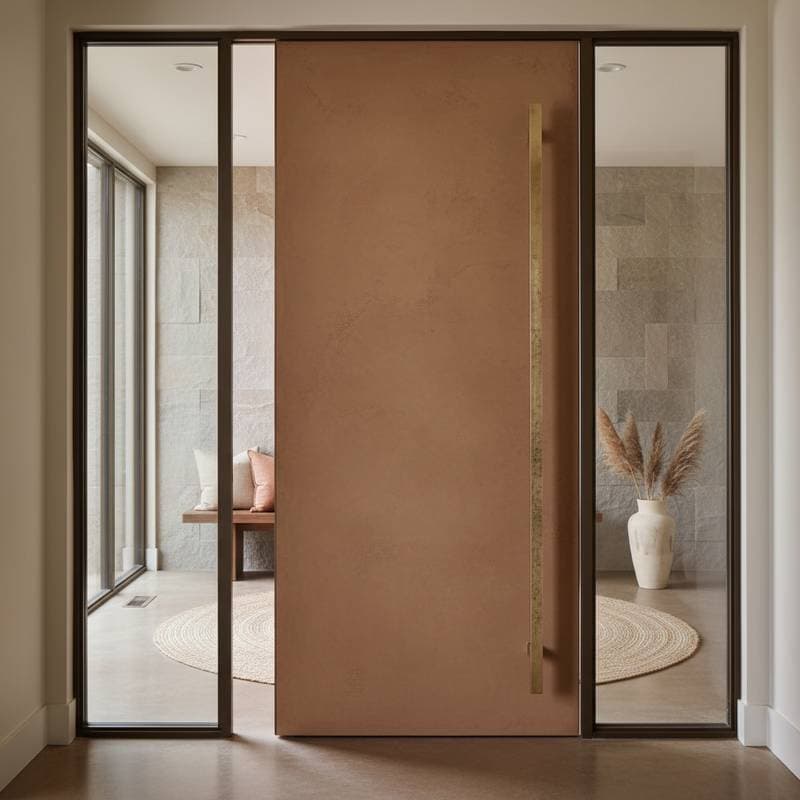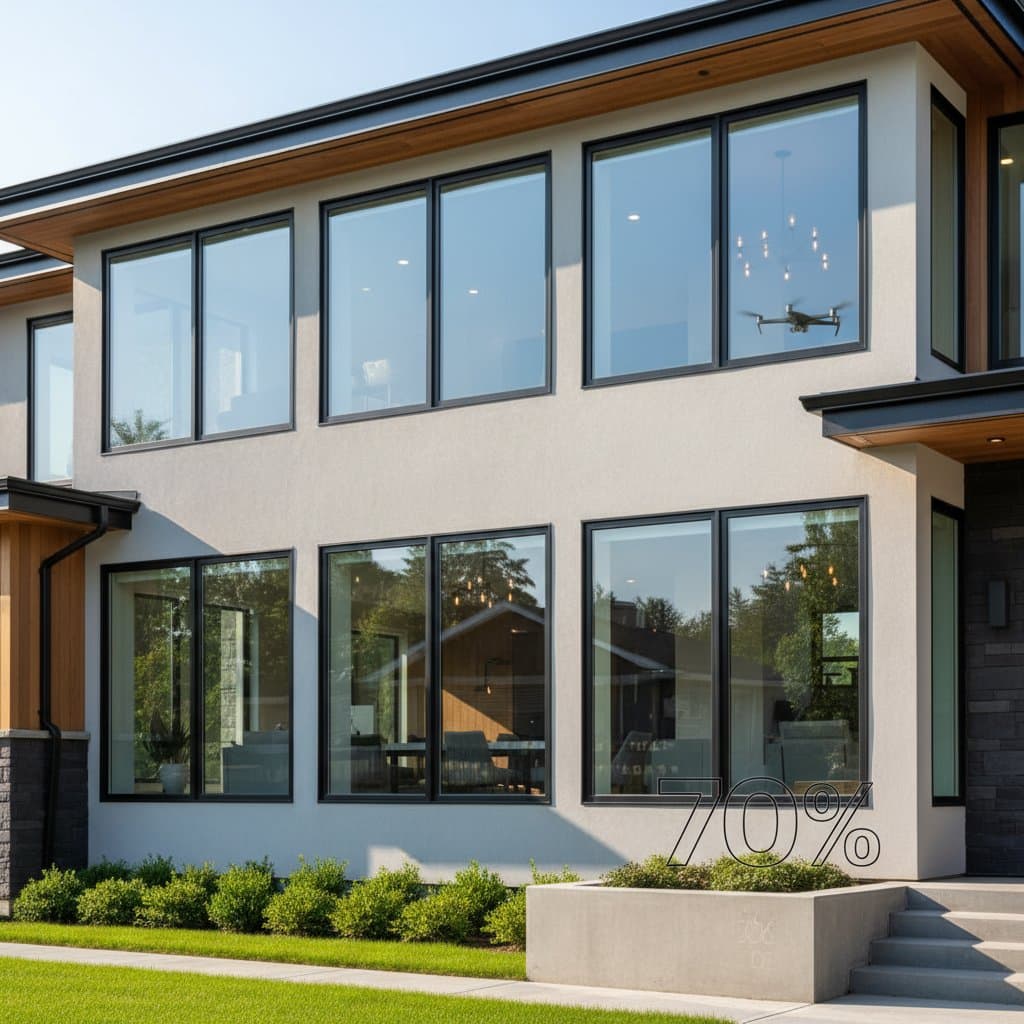Clay Finish Doors: A Warm Shift from Matte Black
Matte black doors have defined contemporary interiors for years, delivering bold contrast and a sleek modern vibe. Now, clay finish doors are emerging as a gentler option, infused with muted warmth and subtle texture. Designers and homeowners favor this choice for its ability to foster serene sophistication while integrating seamlessly with natural elements and neutral schemes.
Clay finishes draw from the soothing essence of earth tones, yet they preserve the crisp profiles of modern architecture. This balance of restraint and coziness suits diverse settings, from streamlined minimalist rooms to homes that merge contemporary and classic influences. The result is an inviting visual harmony that elevates style without overwhelming the senses.
Three Strategies to Achieve the Clay Look
Budget Strategy ($400 - $1,200)
- Select paints in clay-like shades, such as muted terracotta, greige, or warm taupe, for existing interior doors. Opt for satin or eggshell sheens to provide a soft glow and simplify upkeep.
- Focus updates on prominent doors in living rooms or hallways to maximize impact. Swap out hardware for brushed nickel or antique brass pulls to refresh without replacing entire doors.
- Allocate funds for a single focal door, like the entryway, in a full clay application. This targeted upgrade can redefine the home's welcoming character.
Mid-Range Strategy ($1,200 - $3,500)
- Source prefinished doors from MDF or solid wood in earthy clay shades. Complement them with hardware in soft black or bronze for a stable, anchored aesthetic.
- Prioritize doors with UV-resistant factory finishes to ensure color stability over time. Solid-core options enhance acoustics and add substantial presence.
- Add subtle enhancements like slim glass panels or etched inserts. These elements diffuse light throughout rooms, softening transitions between spaces.
Premium Strategy ($3,500 - $8,000)
- Commission custom doors from solid wood or high-grade veneers, finished with baked-on clay layers or infused lacquers for layered depth.
- Pair with artisanal hardware in patinated brass or copper, plus hidden hinges and sleek trims for an uninterrupted flow.
- These bespoke finishes endure fading and wear, positioning doors as enduring design assets rather than fleeting updates.
Essential Materials and Finishes
For windows, select frames in bronze or clay hues to echo the doors. Surround with trim in linen or sand tones, secured by hardware in brushed brass or warm pewter for cohesion.
Doors in clay can use painted wood, composites, or laminates, always with low-luster coatings for authenticity. Styles featuring vertical lines or recessed panels add dimension while letting the color shine.
Exterior siding works best in off-white stucco, subtle greige clapboard, or untreated wood. Aim for gentle differentiation that unifies rather than divides.
Trim and accents benefit from neutrals like almond or mushroom. Extend the theme outdoors with clay-hued pots, copper lanterns, or stone walks to create rhythmic repetition.
Practical Maintenance Insights
Clay tones conceal dust and handprints better than deep blacks, which spotlight every mark in busy zones. Still, routine care prevents residue accumulation; wipe with mild soap and water, steering clear of harsh scrubbers that erode finish.
Prefinished doors with sealants cut down on effort. Outdoors, UV barriers guard against sun damage; in bright or salty environments, refresh sealants biennially. Indoors, monthly dusting and moisture avoidance keep interiors fresh with little intervention.
Common Pitfalls to Sidestep
- Layering excess warm metals: Clay provides inherent coziness; limit to one or two accents like brass pulls, balancing with cooler neutrals to avoid clutter.
- Mismatching undertones: Test terracotta's pink warmth against taupe's gray calm; pair with harmonious walls and floors to prevent clashing.
- Bypassing light tests: Apply samples in place; natural light lifts tones, while lamps intensify them, revealing true compatibility.
- Overcommitting budget: Tackle visible areas first, phasing in changes to sustain momentum without overload.
- Neglecting upkeep: Gentle habits preserve even tones; lapses cause patchy gloss on semi-shine surfaces.
Harmonizing Colors and Styles
Build a unified scheme with these clay variations:
- Soft Clay: Muted terracotta enhances white oak floors and pale gray walls for subtle energy.
- Desert Greige: Beige-gray mix fits sleek modern or Nordic designs with effortless poise.
- Warm Mushroom: Creamy taupe links warm and cool realms in versatile applications.
- Burnt Almond: Richer depth contrasts crisp white moldings for grounded drama.
- Dusty Rose Clay: Faint pink edge warms stark minimalism without overpowering.
Pre-Project Photography Guide
- Capture exterior and interior views from varied perspectives at morning, midday, and evening to assess light effects.
- Document style specifics, including trim profiles, ceiling scales, and door dimensions for proportional planning.
- Review local trends or community rules influencing outside colors.
- Assess environmental factors like moisture levels, sunlight hours, and weather shifts.
- Outline spending limits and key focuses prior to sourcing or contracting.
Integrating Clay for Lasting Impact
Transitioning to clay doors reflects a wider embrace of approachable minimalism in homes. These tones craft serene, touchable environments that prioritize ease and authenticity.
From quick paint jobs to tailored installations, clay introduces modernity with nurturing subtlety. It withstands time, demands less care than stark alternatives, and infuses enduring grace into varied architectures.






